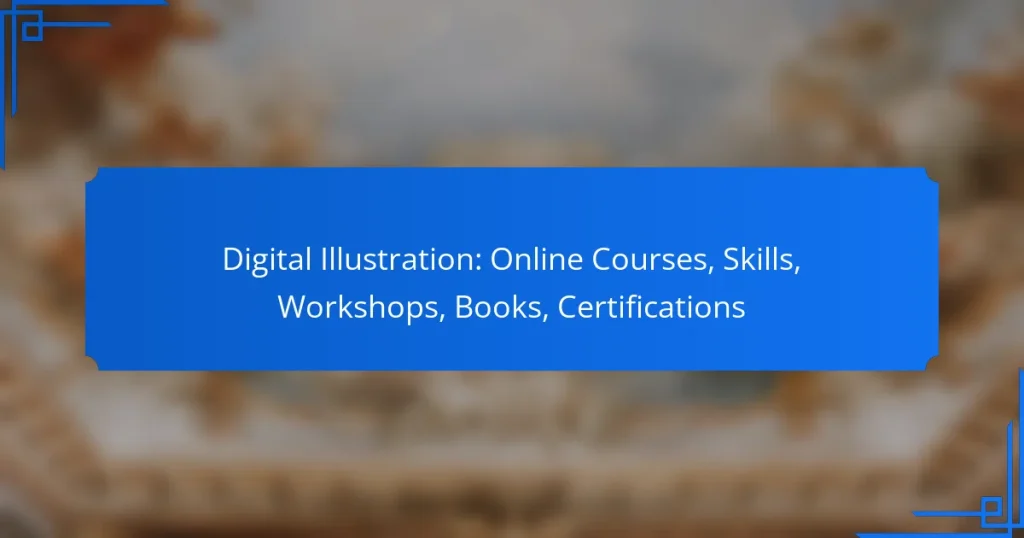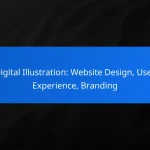Digital illustration is a dynamic field that combines creativity with technology, and there are numerous online courses, workshops, and resources available to help you develop your skills. When selecting a course or workshop, consider factors such as content, instructor expertise, and practical projects to ensure it aligns with your learning goals. Mastering essential skills like software proficiency, color theory, and composition will significantly enhance your ability to create stunning digital artwork.
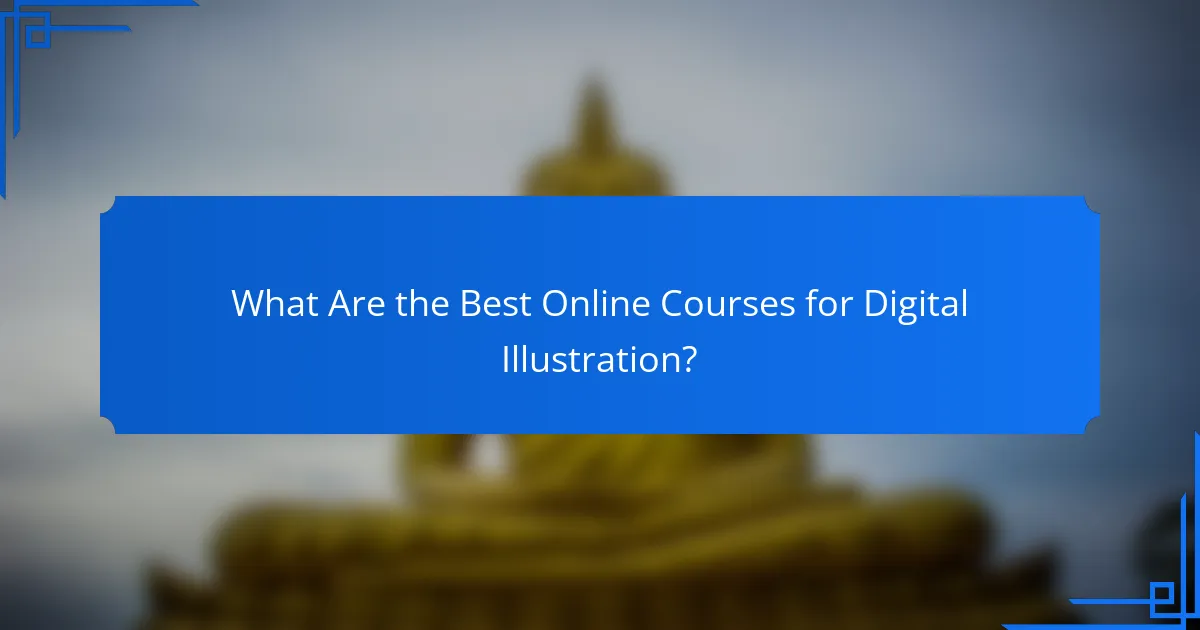
What Are the Best Online Courses for Digital Illustration?
The best online courses for digital illustration offer a variety of styles, techniques, and software training to help you enhance your skills. Consider factors like course content, instructor expertise, and user reviews when selecting a course that fits your needs.
Skillshare Digital Illustration Courses
Skillshare features a wide range of digital illustration courses, catering to both beginners and advanced artists. Courses often focus on specific techniques, such as character design or vector illustration, and typically include project-based learning.
Membership provides access to numerous classes, allowing you to explore various styles and mediums. Look for courses with high ratings and positive feedback to ensure quality instruction.
Coursera Graphic Design Specialization
Coursera offers a Graphic Design Specialization that includes modules on digital illustration as part of a broader curriculum. This series of courses is designed by reputable institutions and covers essential design principles alongside practical illustration skills.
Participants can earn a certificate upon completion, which may enhance your resume. The courses are self-paced, making it easier to fit learning into your schedule.
Udemy Digital Illustration Masterclass
Udemy’s Digital Illustration Masterclass is a comprehensive course that covers various aspects of digital art creation. This course is suitable for those looking to develop a strong foundation in digital illustration techniques.
With lifetime access to the course materials, you can revisit lessons as needed. Check for discounts, as Udemy frequently offers promotions that can significantly reduce course fees.
LinkedIn Learning Illustration Techniques
LinkedIn Learning provides a selection of courses focused on illustration techniques, including digital painting and character creation. These courses are taught by industry professionals and are designed to enhance your technical skills and artistic style.
Membership allows you to access a library of courses, making it easy to explore different topics. Consider taking advantage of the free trial to assess the quality of the courses before committing.
Domestika Courses on Digital Art
Domestika specializes in creative courses, including a variety of options for digital art and illustration. The platform features classes taught by experienced artists, often focusing on unique styles and cultural influences.
Courses are typically project-based, encouraging hands-on learning. Look for community feedback and ratings to find the most popular and effective classes that align with your artistic goals.

How to Choose the Right Digital Illustration Workshop?
Choosing the right digital illustration workshop involves assessing your current skills, understanding the workshop’s duration, verifying the instructor’s qualifications, and ensuring the presence of practical projects. This approach helps you find a workshop that aligns with your learning goals and experience level.
Consider Your Skill Level
When selecting a workshop, first evaluate your skill level in digital illustration. Beginners should look for introductory courses that cover fundamental techniques, while more experienced artists might seek advanced workshops that focus on specific styles or software. Assessing your proficiency will help you avoid frustration and ensure you gain valuable knowledge.
Many workshops categorize their content as beginner, intermediate, or advanced. Look for descriptions that clearly outline the expected skill level to find a suitable match for your expertise.
Evaluate Workshop Duration
The duration of a workshop can significantly impact your learning experience. Short workshops may provide quick insights but might lack depth, while longer sessions often allow for more comprehensive exploration of topics. Consider how much time you can commit and what you hope to achieve.
Workshops can range from a few hours to several weeks. If you prefer a more immersive experience, look for multi-day workshops that offer extended sessions, allowing for more practice and feedback.
Check Instructor Credentials
Instructor credentials are crucial when selecting a workshop. Look for instructors with professional experience in digital illustration, such as published artists or industry professionals. Their background can provide valuable insights and enhance your learning.
Research the instructor’s portfolio and reviews from past students. A well-regarded instructor can make a significant difference in the quality of your workshop experience.
Look for Hands-On Projects
Hands-on projects are essential for applying what you learn in a digital illustration workshop. Workshops that include practical assignments allow you to practice techniques and receive constructive feedback, which is vital for skill development.
Check the workshop syllabus for project details. A good workshop should offer opportunities to create original artwork, which can help solidify your understanding and boost your confidence in your abilities.
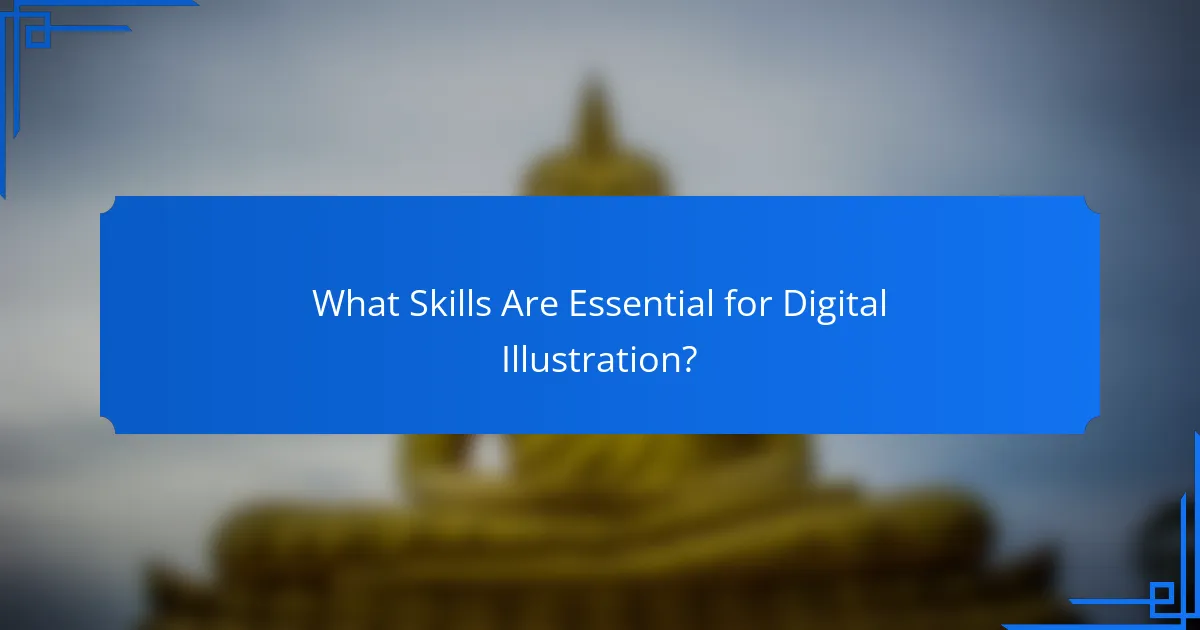
What Skills Are Essential for Digital Illustration?
Essential skills for digital illustration include technical proficiency with software, a solid grasp of color theory, composition techniques, and familiarity with various digital tools. Mastering these areas enhances creativity and efficiency in producing high-quality illustrations.
Proficiency in Adobe Illustrator
Adobe Illustrator is a leading software for digital illustration, making proficiency in it crucial for illustrators. Understanding its tools, such as the pen tool, layers, and vector graphics, allows for precise and scalable artwork.
To improve your skills, consider taking online courses or tutorials that focus on specific features of Illustrator. Regular practice, such as creating daily sketches or projects, can significantly enhance your proficiency.
Understanding of Color Theory
A strong understanding of color theory is vital for creating visually appealing illustrations. This includes knowledge of color harmony, contrast, and the psychological effects of colors on viewers.
To apply color theory effectively, experiment with color palettes and use tools like Adobe Color to create harmonious combinations. Remember to consider the mood and message of your illustration when selecting colors.
Mastery of Composition Techniques
Composition techniques dictate how elements are arranged within an illustration, influencing the overall impact. Key principles include the rule of thirds, balance, and focal points, which guide the viewer’s eye through the artwork.
Practice by analyzing well-composed illustrations and recreating them to understand the underlying techniques. Additionally, sketching thumbnails can help plan your composition before diving into detailed work.
Familiarity with Digital Tools
Familiarity with various digital tools, such as graphic tablets and software plugins, enhances the illustration process. Tools like Wacom tablets provide precision and a natural drawing experience, while plugins can streamline workflows.
Stay updated on new tools and technologies by following industry trends and participating in workshops. Experimenting with different tools can help you find what best suits your style and enhances your productivity.
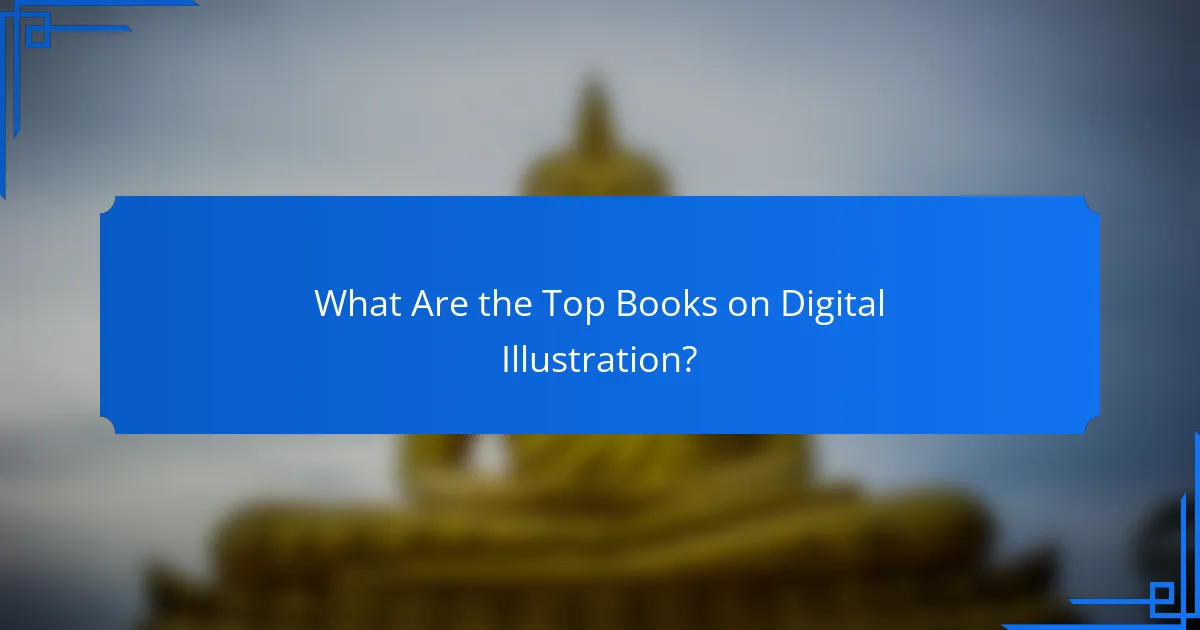
What Are the Top Books on Digital Illustration?
The top books on digital illustration provide essential techniques, insights, and inspiration for artists at various skill levels. These resources cover a range of topics from foundational skills to advanced digital painting methods, making them valuable for anyone looking to enhance their digital art capabilities.
“Digital Painting Techniques” by 3DTotal Publishing
This book is a comprehensive guide that explores various digital painting methods used by professional artists. It features step-by-step tutorials and showcases a variety of styles, allowing readers to experiment with different techniques.
With contributions from numerous industry professionals, it offers insights into the creative process and practical tips for achieving high-quality results. Whether you’re a beginner or an experienced artist, this book can help refine your digital painting skills.
“The Digital Artist’s Handbook” by David Hockney
David Hockney’s “The Digital Artist’s Handbook” serves as a practical guide for artists transitioning to digital mediums. It discusses the tools and software available, emphasizing how to leverage technology to enhance artistic expression.
This book also includes exercises that encourage experimentation and creativity, making it suitable for artists looking to expand their skill set. Hockney’s unique perspective on art and technology provides valuable insights for anyone interested in digital illustration.
“Illustration School: Let’s Draw” by Sachin Teng
The book is filled with practical exercises and tips that encourage readers to develop their unique style. Its approachable format makes it ideal for beginners who want to build confidence in their illustration skills.
“Drawing on the Right Side of the Brain” by Betty Edwards
Betty Edwards’ “Drawing on the Right Side of the Brain” is a classic that focuses on enhancing observational skills and creativity. While not exclusively about digital illustration, its principles are applicable across all art forms, including digital media.
This book emphasizes the importance of seeing subjects differently, which can significantly improve an artist’s ability to create compelling illustrations. It includes exercises that can be adapted for digital tools, making it a timeless resource for artists of all levels.
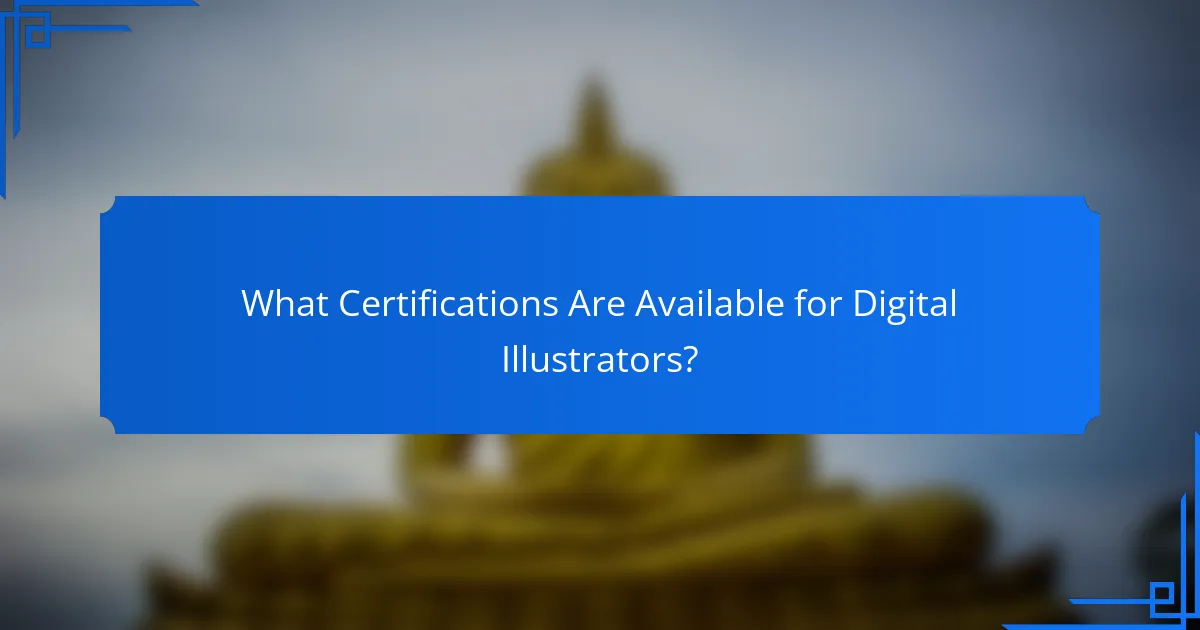
What Certifications Are Available for Digital Illustrators?
Digital illustrators can pursue various certifications to enhance their skills and credibility in the industry. These certifications often focus on specific software or techniques and can significantly improve job prospects and professional recognition.
Adobe Certified Expert (ACE)
The Adobe Certified Expert (ACE) certification is a widely recognized credential for digital illustrators proficient in Adobe software like Illustrator and Photoshop. To obtain this certification, candidates must pass a rigorous exam that tests their knowledge and skills in using Adobe products effectively.
Preparing for the ACE exam typically involves hands-on practice and studying Adobe’s official resources. Many online courses and workshops are available to help candidates get ready, often costing between $100 to $300 for exam fees and preparation materials.
Certified Digital Illustrator (CDI)
The Certified Digital Illustrator (CDI) program focuses on validating the skills of illustrators in digital techniques and tools. This certification covers various aspects of digital illustration, including composition, color theory, and software proficiency.
To earn the CDI certification, candidates must complete a series of projects and pass an assessment. This program is suitable for both beginners and experienced illustrators looking to formalize their skills. Costs can vary, typically ranging from $200 to $500, depending on the institution offering the certification.
Graphic Design Certification
Many community colleges and online platforms offer graphic design certification programs, with costs ranging from $300 to $1,500. These programs usually take a few months to complete and can enhance an illustrator’s portfolio and job opportunities.
Online Course Certifications
Numerous online platforms offer certifications in digital illustration, such as Coursera, Udemy, and Skillshare. These courses often cover specific tools, techniques, or styles and can be a flexible option for illustrators seeking to improve their skills.
Course fees vary widely, typically from $20 to $200, and many platforms offer free trials or financial aid. Completing these courses can provide a certificate of completion, which can be added to a resume or portfolio to demonstrate commitment to professional development.
